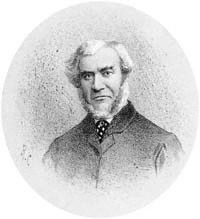Edmond Beales on:
[Wikipedia]
[Google]
[Amazon]
Edmond Beales (1803–1881) was the President of the 
Reform League
The Reform League was established in 1865 to press for manhood suffrage and the ballot in Great Britain. It collaborated with the more moderate and middle class Reform Union and gave strong support to the abortive Reform Bill 1866 and the success ...
and was a central figure in the 19th century British reform movement.

Biography
Edmond Beales was the son of Samuel Pickering Beales, a merchant ofNewnham, Cambridgeshire
Newnham is a suburb of the city of Cambridge in England. Historically, the name refers to a hamlet centred on a mill on the River Cam, a short distance to the southwest of the city centre. The modern council ward of Newnham covers much of the we ...
and was born on 3 July 1803. He was educated at Eton and Trinity College, Cambridge
Trinity College is a constituent college of the University of Cambridge. Founded in 1546 by King Henry VIII, Trinity is one of the largest Cambridge colleges, with the largest financial endowment of any college at either Cambridge or Oxford. ...
, gaining a B.A. in 1825 and an M.A. in 1828. He became a barrister in 1830. He married Elizabeth, the daughter of James Marshall, manager of the Provincial Bank of Ireland.
Beales is best known as the President of the Reform League
The Reform League was established in 1865 to press for manhood suffrage and the ballot in Great Britain. It collaborated with the more moderate and middle class Reform Union and gave strong support to the abortive Reform Bill 1866 and the success ...
who campaigned for representation of the working classes in parliament and whose efforts culminated in the Reform Act 1867
The Representation of the People Act 1867, 30 & 31 Vict. c. 102 (known as the Reform Act 1867 or the Second Reform Act) was a piece of British legislation that enfranchised part of the urban male working class in England and Wales for the first ...
. The League is principally remembered for two great demonstrations in Hyde Park both of which were banned by the Government. At the first, on 23 July 1866, the League resolved to assemble at Marble Arch
The Marble Arch is a 19th-century white marble-faced triumphal arch in London, England. The structure was designed by John Nash in 1827 to be the state entrance to the cour d'honneur of Buckingham Palace; it stood near the site of what is toda ...
outside the Park and attempt to enter. A massive crowd assembled at the Arch and Beales attempted to enter the Park. The police prevented this amid scuffles. Part of the crowd then pulled down the railings and entered the Park. Three days of what are variously described as "skirmishes" or "riots" ensued. The disturbances ceased after Beales met with the Home Secretary and offered to talk the revellers into leaving the Park.
The second great Hyde Park rally was on 6 May 1867. The rally was again banned by the Government but they were unable to stop it taking place due to the massive numbers who turned out. The procession started off from the Reform League's headquarters, at 8 Adelphi Terrace, headed by a cab containing Beales, his friend Colonel Dickson and a few other aristocratic supporters. As they headed up Regent Street it was decided that these gentlemen would visit Gunter's Tea Shop
Gunter's Tea Shop in London's Berkeley Square had its origins in a food business named "Pot and Pine Apple" started in 1757 by Italian Domenico Negri. Various English, French and Italian wet and dry sweetmeats were made and sold from the business ...
in Berkeley Square and so left the procession. This left John Bedford Leno and a few others, at the head of the procession who proceeded to face the police at Marble Arch and to hold the famous 1867 Hyde Park demonstration.
Edmond died at Osborne House, Bolton Gardens South, Brompton, Middlesex on 26 June 1881. Professor Harrison wrote of Beales that he was "one of the revising barristers for Middlesex
Middlesex (; abbreviation: Middx) is a historic county in southeast England. Its area is almost entirely within the wider urbanised area of London and mostly within the ceremonial county of Greater London, with small sections in neighbour ...
until he was deprived of his appointment. He enjoyed an unequalled prestige among all sections of working class reformers. It was correctly said that 'he lost his practice, his office, his voice, his health in the people's cause.'",Harrison p 140
Career
* 25 Jun 1830 - Barrister M.T. (Conveyancer) * 1862-66 - Revising Barrister for Middlesex * 1863 - President of National League for Independence of Poland * ???? - Chairman of Circassian Committee * 1865-69 - President of the Reform League * 1868 - Parliamentary Candidate for Tower Hamlets * 1870-81 - Judge for county courts of Beds and CambsReferences
* * John Bedford Leno. ''The Aftermath with Autobiography of the Author''. Reeves & Turner. London. 1892External links
* {{DEFAULTSORT:Beales, Edmond English socialists People from Cambridge 1803 births 1881 deaths People educated at Eton College Alumni of Trinity College, Cambridge English barristers